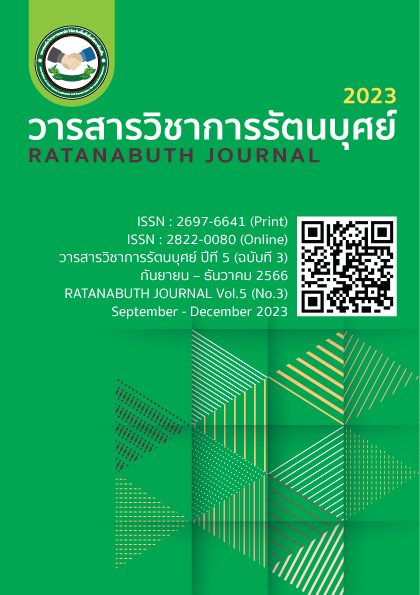The Development of Participatory Internal Quality Assurance Model for Educational Quality Improvement of Anuban Yasothon School Under the jurisdiction of Yasothon Primary Educational Service Area Office 1 The Development of Participatory Internal Quality Assurance Model for Educational Quality Improvement of Anuban Yasothon School Under the jurisdiction of Yasothon Primary Educational Service Area Office 1
Main Article Content
Abstract
Anuban Yasothon School has the results of educational management because the students have low academic achievement in all learning subjects. The educational standards of the educational institution should be developed and raised to meet the educational standards. The objectives of this research are 1) to study basic information for model development 2) to create, develop and evaluate a quality assurance model 3) to trial the quality assurance model and 4) to evaluate the results of the trial of using a participatory internal quality assurance model to develop the educational quality of Anuban Yasothon School. Research tools include questionnaires, interviews, focus groups. Analyzed by descriptive statistics. and content analysis Create patterns with experts Experimenting with models with operations and evaluated by experts. The results of the research found that the Product Quality Cycle or the PDCA Cycle should be used to determine the participatory internal educational quality assurance model. The results of developing a participatory internal quality assurance model to develop the quality of education at Anuban Yasothon School are as follows: 1) Principles of the model It consists of principles of educational quality assurance and participation principles. 2) The objective of the model is to develop the quality of education at Anuban Yasothon School. 3) The work system/mechanism of the model is operated under the working system of Deming's quality cycle or the PDCA cycle 4. 4) The operation method/operation process of the model and 5) Conditions of the model leading to success are operating according to the King's science "principles of understanding, access, development". Schools must encourage teachers and personnel to perform their duties starting with an open mind. Explosive from within, creating knowledge, mutual understanding, developing skills in various tasks, as well as creating awareness of roles and responsibilities for teachers and school personnel and to participate in every step of the process The results of the model evaluation were at the highest level. The results of the evaluation of the model trial were at the highest level in every aspect and had higher educational outcomes.
Article Details

This work is licensed under a Creative Commons Attribution-NonCommercial-NoDerivatives 4.0 International License.
References
จุฑามาศ พันสวรรค์. (2562). การพัฒนารูปแบบการมีส่วนร่วมของคณะกรรมการสถานศึกษาในการบริหารจัดการศูนย์พัฒนาเด็กเล็กเทศบาลนครเชียงใหม่. วิทยานิพนธ์ปริญญาครุศาสตรมหาบัณฑิต
สาขาวิชาการบริหารการศึกษา ,เชียงใหม่: มหาวิทยาลัยราชภัฏเชียงใหม่.
ชนันธิดา รัตนปราณี. (2553). การพัฒนาแนวทางการดำเนินงานประกันคุณภาพการศึกษาภายในสถานศึกษา โรงเรียนบ้านหนองจาน อำเภอขามสะแกแสง จังหวัดนครราชสีมา. วิทยานิพนธ์ปริญญาการศึกษามหาบัณฑิต สาขาวิชาบริหารการศึกษา คณะศึกษาศาสตร์, มหาสารคาม: มหาวิทยาลัยมหาสารคาม.
ทิศนา แขมมณี. (2545). ศาสตร์การสอน. กรุงเทพฯ : สํานักพิมพ์แห่งจุฬาลงกรณมหาวิทยาลัย.
ทิศนา แขมมณี. (2550). การสอนจิตวิทยาการเรียนรู้ เรื่องศาสตร์การสอนองค์ความรู้เพื่อการจัดกระบวนการเรียนรู้ที่มีประสิทธิภาพ. พิมพค์รั้งที่ 5, กรุงเทพฯ : สำนักพิมพ์แห่งจุฬาลงกรณ์มหาวิทยาลัย.
ธีระ รุญเจริญ.(2550). ความเป็นมืออาชีพในการจัดและบริหารการศึกษายุคปฏิรูปการศึกษา. พิมพ์ครั้งที่ 3, กรุงเทพฯ : ข้าวฟ่าง.
ผ่องศรี แก้วชูเสน. (2555). การพัฒนารูปแบบการประกันคุณภาพภายในสถานศึกษาโดยใช้การประเมินแบบเสริมพลังสำหรับวิทยาลัยเกษตรและเทคโนโลยี. กรุงเทพฯ: มหาวิทยาลัยสุโขทัยธรรมธิราช.
เยาวดี รางชัยกุล วิบูลย์ศรี. (2551). การประเมินโครงการแนวคิดและแนวปฏิบัติ. ครั้งที่ 6, กรุงเทพฯ : สำนักพิมพ์แห่งจุฬาลงกรณ์มหาวิทยาลัย.
รัตนะ บัวสนธ์. (2552). วิจัยเชิงคุณภาพทางการศึกษา. กรุงเทพฯ : จุฬาลงกรณ์มหาวิทยาลัย.
ลลิตา ปวะบุตร. (2555). การมีส่วนร่วมของชุมชนในการจัดการศูนย์พัฒนาเด็กเล็กเทศบาลตำบลสันปูเลย อำเภอดอยสะเก็ด จังหวัดเชียงใหม่. การศึกษาอิสระศึกษาศาสตรมหาบัณฑิต, เชียงใหม่:มหาวิทยาลัยเชียงใหม่.
วัชรศักดิ์ สงค์ปาน. (2561). การพัฒนารูปแบบการบริหารโรงเรียนเพื่อบรรลุผลการประกันคุณภาพภายในของโรงเรียนมัธยมศึกษาภาคใต้ฝั่งอันดามัน. วิทยานิพนธ์ปรัชญาดุษฎีบัณฑิต สาขาวิชาบริหารการศึกษา, สงขลา: มหาวิทยาลัยหาดใหญ่.
วัลภา พรหมฤทธิ์. (2550). การมีส่วนร่วมของผู้ปกครองในการบริหารโรงเรียนอาชิวะศึกษา: กรณีศึกษาเขตภาษีเจริญและบางกอกใหญ่. วิทยานิพนธ์ศิลปศาสตรมหาบัณฑิต, กรุงเทพฯ: สถาบันบัณฑิตพัฒนบริหารศาสตร์.
วาโร เพ็งสวัสดิ์.(2553).การวิจัยพัฒนารูปแบบ. วารสารมหาวิทยาลัยราชภัฏสกลนคร, 2(4), 1–16.
สำนักงานเลขาธิการสภาการศึกษา. (2560). แผนการศึกษาแห่งชาติ พ.ศ. 2560-2579. กรุงเทพฯ : สำนักงานเลขาธิการสภาการศึกษา กระทรวงศึกษาธิการ.
สำนักทดสอบทางการศึกษา. (2563). การติดตามตรวจสอบคุณภาพการศึกษาของสถานศึกษาตามกฎกระทรวงว่าด้วยระบบ หลักเกณฑ์และวิธีการประกันคุณภาพการศึกษา พ.ศ.2563. กรุงเทพฯ : โรงพิมพ์ชุมชนสหกรณ์การเกษตรแห่งประเทศไทยจำกัด.
โสภา มัดลัง. (2551). การมีส่วนร่วมของผู้ปกครองในการส่งเสริมพัฒนาการเด็กปฐมวัย ในศูนย์พัฒนาเด็กเล็กก่อนวัยเรียนชุมชนเอื้ออารีย์สังกัดกรุงเทพมหานคร. กรุงเทพฯ : มหาวิทยาลัยราชภัฏพระนคร.
Eigner. (2011). The World Journal of Biological Psychiatry. Retrieved fromhttp://www.wfsbp.org/fileadmin/user_upload/Treatment_Guidelines/ proquest.com/.
John W.Best and James V. Kahn (2006). Research in Education. 10th ed, Massachusetts : Pearson Education Inc.


